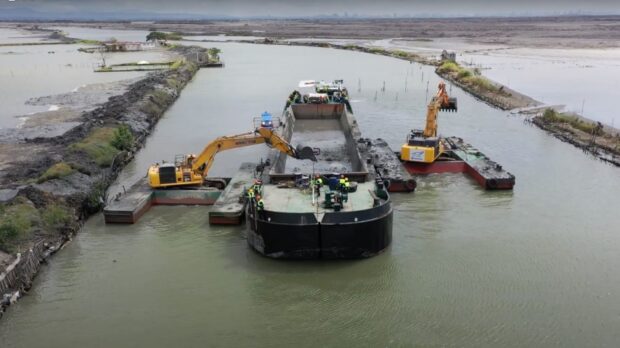
San Miguel Corp’s dredging equipment are shown during clean-up operations at the Maycapiz-Taliptip River. In just over a year, the company reported that over 2 million metric tons of silt and waste were removed from the several rivers in Bulacan.
MANILA, Philippines —Conglomerate San Miguel Corp. is expanding its river cleanup program in Luzon to expand water-carrying capacity ahead of the rainy season.
SMC said it started conducting detailed studies at the Pampanga River, following the completion of river studies in another catch basin in Bulacan, where the corporate giant is building a P734 billion airport complex.
SMC president and CEO Ramon S. Ang said river waste removal efforts can mitigate flooding, especially in low-lying areas, during heavy rains.
He said siltation and pollution have made many rivers “narrow, shallow, and less capable of handling large volumes of floodwater, leading to severe flooding in adjacent areas”.
READ: SMC to revive Pasig River as part of P95 billion PAREX project
Residents in parts of Bulacan said SMC’s new airport project was a major contributor to flooding but the conglomerate said the main cause was pollution and the conversion of low-lying lands to fish ponds.
P2-B Pasig River cleanup
“Heavy siltation and pollution in these rivers are major contributors to the widespread flooding in both Bulacan and Pampanga,” SMC said.
The food, drinks, energy and infrastructure conglomerate earlier completed a P2-billion cleaning program at the Pasig River.
READ: BIZ BUZZ: SMC river cleanup goes north
The company said it removed over two million metric tons of silt and waste “covering a distance of around 25 kilometers of river channels in Bulacan, initially focusing in areas around the future New Manila International Airport and upstream rivers in Obando, Bulakan, Bocaue and Meycauayan City within the same catch basin”.
“Since the completion of our Pasig and Tullahan river cleanups, communities and stakeholders have reported lesser incidence of heavy flooding in their areas. In instances where there is still flooding, floodwaters still recede faster,” Ang said.


